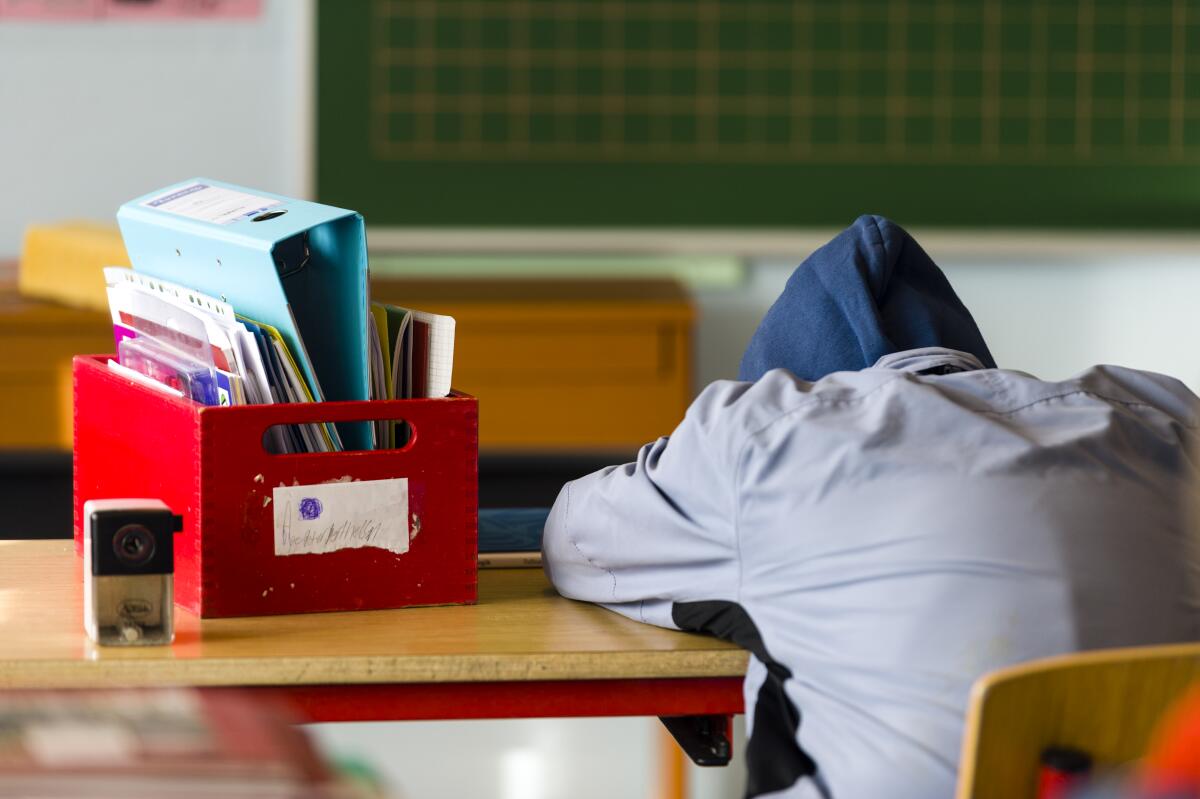Op-Ed: Sleep deprivation is an important part of our youth mental health crisis

- Share via
California achieved a first in the nation this month: implementing a statewide law setting limits on the earliest school start times for adolescents.
As of July 1, the law requires start times of 8:30 a.m. or later at public high schools and 8 a.m. or later for middle schools, based on policy recommendations called for in 2014 by the American Academy of Pediatrics and subsequently endorsed by other major medical and public health organizations. And for good reason: Research shows that when schools start later in the morning, students get more sleep.
California’s law is a real victory, considering that sleep deprivation is the norm for far too many teens — a situation with worrying implications across the board, but especially for the growing crisis of youth mental health.
Meta, Google are among those heeding the U.S. surgeon general’s call to action on mental health, although they face criticism.
Although teens should get eight to 10 hours of sleep a night, government data show that only about 1 in 5 high-schoolers meets even the minimum of that range. This chronic sleep loss exacerbates depression, anxiety and even suicidality, which is why later school start times were one of the recommendations in the U.S. surgeon general’s December advisory on youth mental health.
Findings released in April by the Centers for Disease Control and Prevention underscore the urgency of the situation: Among high-schoolers surveyed during the first half of 2021, 44% said they’d had “persistent feelings of sadness or hopelessness” during the past year, and 20% had seriously contemplated suicide. Hospital emergency rooms have seen an influx of kids and teens in psychiatric crisis.
Addressing the situation requires a multipronged approach that includes focusing on the crucial role of sleep. Sleep deprivation ramps up adolescents’ tendency toward impulsivity and impaired judgment (which are already more pronounced compared to adults). And research indicates that sleep deprivation and suicidality have a dose-response relationship: As teens’ sleep loss grows, their risk for suicidal thoughts and attempts increases.
“You can’t talk about teen suicide without looking at underlying mental health and sleep,” says Dr. Maida Chen, director of the Sleep Center at Seattle Children’s Hospital. Most teens who are suicidal usually have some degree of mood disorders such as anxiety or depression, she says, which can be worsened by poor sleep and further escalate a vicious cycle between sleep loss, mental health and suicidality.
Regardless of what triggers their mental health issues, once teens “get into that cycle, sleep is further impaired,” Chen says. “Treating the mood disorder won’t be as beneficial unless you address the sleep as part of it.”
All of this evidence points to sleep as a critical piece of improving adolescent health. As Chen explains, “behavioral and lifestyle modifications, without medications or intensive therapy” can optimize sleep for all teens, including those struggling with suicidal thoughts and attempts.
As a gay Latino, I encountered limited and lacking treatment options.
In addition to their effectiveness, sleep interventions offer a relatively quick response to the teen mental health crisis. While there is urgent need for more access to mental health services, meeting that need will take time. California established its Children and Youth Behavioral Health Initiative in 2021 to direct $4.4 billion to this issue — but it has a five-year timeline. A bill introduced in the state Senate to help recruit 10,000 mental health clinicians to treat young people, backed by California Supt. of Public Instruction Tony Thurmond, has yet to pass and would take several years to yield results.
In the meantime we can — and should — provide chronically sleep-deprived teens with the opportunity to attain enough sleep.
Moving school start times is one step. California’s law, which has limited exceptions, will benefit students whose schools previously started far earlier than what’s recommended (as early as 7 a.m. in some cases). New York and New Jersey are already considering similar bills. Other states should speedily pursue these legal guardrails to ensure healthy start times as a proven way to tackle the epidemic of teen sleep deprivation.
School districts can pursue this change on their own, but not enough have done so. (The most recent national data shows an average high school start time of 8 a.m.) Those that have pushed back start times have seen positive results. Later starts are associated with a sustained increase in sleep and — alongside other improvements such as increased graduation rates — mental health benefits. Studies show that students who get more sleep are less likely to report that they have recently felt sad or hopeless or have recently contemplated or attempted suicide.
Other needed changes will require a shift in thinking, such as dialing down the pressure cooker environment of high school. For many teens, the hours spent in school are just a small portion of their days: Adding homework, extracurriculars and jobs, there simply isn’t a window left for eight to 10 hours of sleep. Teens end up skimping on sleep to fit everything in, but it’s a counterproductive approach. The California State Parent Teacher Assn. has endorsed schools lowering their homework loads (a stance since adopted by the national PTA). Meanwhile, families can pare down their teens’ extracurricular commitments where feasible — and, ideally, with encouragement from schools.
Even more broadly, though, it’s time for greater cultural awareness of the value of sleep. Chronic sleep deprivation shouldn’t be a fact of adolescent life. With so much at stake for young people, especially now, it’s time to make sleep a priority rather than an afterthought.
Lisa L. Lewis is the author of “The Sleep-Deprived Teen: Why Our Teenagers Are So Tired, and How Parents and Schools Can Help Them Thrive.”
More to Read
A cure for the common opinion
Get thought-provoking perspectives with our weekly newsletter.
You may occasionally receive promotional content from the Los Angeles Times.












